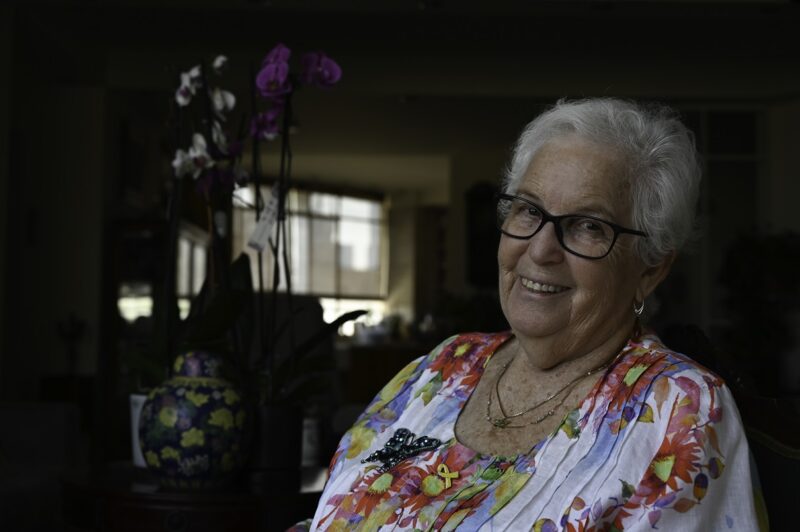
Hannah Gofrit
Holocaust Survivor
“I was born in 1935 in the town of Biała Rawska in Poland, about 70 kilometers east of Warsaw. I was an only child, and my life was happy. I was a child of nature – I remember how every morning I would run to play by the river, sometimes with my Polish girlfriends. I loved picking mushrooms and blueberries in the forest and watching butterflies and crickets. For me, it was paradise.
In 1939, when World War II broke out and the Germans invaded Poland, my life didn’t change immediately.
For the first two years of the war, we continued living relatively normal lives in our small town. The moment things truly changed for me was on my first day of school, September 1st, 1941. I was six years old and starting first grade.
I remember my Polish friends came to pick me up, and together we walked to school. At the entrance stood a guard who greeted all the children as they entered. Since it was a small town, he knew everyone. But when I tried to go in, he stopped me and said, ‘You can’t attend this school because you’re Jewish.’
I was in shock. What did that mean – that I couldn’t go to school? What was ‘Jewish’? How was I different from my Polish friends?
The bell rang, and my friends went inside. I stood there, holding onto the school fence, confused and heartbroken. Thoughts raced through my mind: I’m Jewish? What does it mean to be a Jew? I tried not to cry. And then I told myself – if I’m Jewish, then I will be a proud Jew for the rest of my life. That was a promise I made to myself, and one I’ve kept ever since.
As the situation in our town became more dangerous, my parents made the difficult decision to send me to a Polish family willing to take me in and protect me. My mother promised me that once the war was over, she and my father would come for me. It was supposed to be temporary. But I didn’t last long there. When I arrived at their home, I refused to eat, drink, or speak. Eventually, the Polish couple had no choice but to return me to my parents.
Things in our town continued to worsen. In 1942, the Jews of Biała Rawska were deported to Treblinka. My father tried desperately to get forged identity papers for us. In the end, he was only able to get papers for my mother and me. He had to say goodbye to us.
I still remember our last conversation. He told me we needed to part ways and asked me not to worry about him – he was joining the partisans in the forest, where he believed he’d be safer. He promised that we’d all meet again after the war, in our hometown. That was the last time I saw my father. To this day, I don’t know what happened to him.
With the false papers my father secured, my mother and I made our way to Warsaw. For two years, we hid with the
Skowronek’s family, whom we knew from our town. They were friends of a close friend of my mother’s. Their apartment was small – just two rooms and a tiny kitchen – so there was no real place to hide. When we were in danger, we had to hide inside a closet. We couldn’t make a sound-not even a sneeze-for fear of being discovered.
Inside that dark closet, I imagined I was a butterfly. Through guided imagery, I transformed myself into a butterfly flying over my hometown, Biała Rawska. I pictured myself fluttering near the river where I used to play, over the forests and fields of my childhood. In this way, I escaped the harsh, terrifying reality of hiding for hours in a dark closet, terrified of being discovered. Even if it was just in my mind, being a butterfly saved me.
After nearly two years in hiding, and as the bombings over Warsaw grew heavier, my mother and I left the Skowronek family. We pretended to be devout Polish Catholics and went to Germany, where we were placed in forced labor camps. For a year, we worked in an AEG factory. When the Red Army approached, we fled the camp and were eventually liberated by the Red Army.
After the war, we returned to our hometown, hoping to find surviving relatives. But we soon discovered that we were the only ones who survived. We left quickly and went to the city of Łódź. There, my mother met Yosef Kupershmid, a Holocaust survivor who had lost his wife and daughter. They married, and I was blessed with a father and a younger brother, Avraham, who was born a year later.
Life is not easy. I think of it as a ladder with many rungs. If we can make it past the first one, we prove that we have the strength to keep climbing. Just as I became a butterfly and rose above the hardships of my own personal ladder, I believe that everyone has the ability to climb through the difficult steps in their own lives. What you need is faith, optimism, and, based on my experience, sometimes a little guided imagination.”
